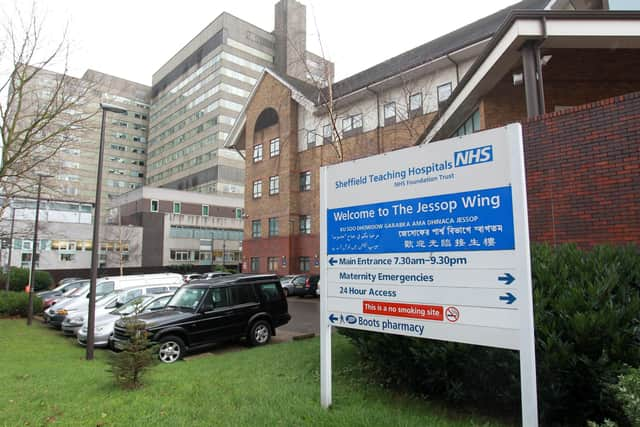Jessop Wing: 'Beautiful' baby Cora Sinnott died at Sheffield maternity unit day after birth, inquest hears
and live on Freeview channel 276
Cora Sinnott was born at the maternity unit, which is part of the Sheffield Teaching Hospitals trust, on July 18, 2020. She sadly died there the next day.
An inquest into Cora’s death resumed at Sheffield Coroner’s Court on Monday, October 10. The court heard how her mother, Hannah, had planned to have a home birth, which initially appeared to be progressing normally after her contractions began on the evening of July 17. However, she was transferred to the Jessop Wing the next morning after progress slowed and, according to a midwife who attended her home, she appeared to be ‘becoming quite distressed’.


Advertisement
Hide AdAdvertisement
Hide AdOnce there she was given an epidural and when the baby’s heart rate slowed it was decided at 10.26am on July 18 that a caesarean operation was required. The operation took place and Cora was delivered at 10.48am that morning and immediately placed in the care of the neo-natal team.
Cora sadly died the next day and Dr Sophie Stenton, who carried out the post-mortem, said there were signs of hypoxia, which is where the body has been deprived of oxygen. She recorded this as the primary cause of death.
Alison Brodrick, a consultant midwife at the Jessop Wing, told the inquest that Hannah had been 41 weeks and two days pregnant when she called triage on July 17, at 9.58pm, to say her waters had broken and contractions had begun. Ms Brodrick said community midwife Helen Green had attended after Hannah called again at around 3.30am the next day to say her contractions were getting more regular and she required some pain relief. An assessment at 6.10am that morning showed she was fully dilated and was getting urges to push, at which point she entered the birthing pool at her home.
Jessop Wing Sheffield: Failings at city hospital are 'extremely worrying', say medical negligence lawyers
After an hour there was no visible progress and at 7.50am a further assessment was carried out and a ‘rim of cervix’ was noted, meaning she was not fully dilated. At this point, said Ms Brodrick, the decision was taken to transfer Hannah to the Jessop Wing for ‘ongoing care’.
Advertisement
Hide AdAdvertisement
Hide AdShe arrived there at 8.40am and was given an epidural and monitored, before being given an infusion of oxytocin to ‘increase the speed and frequency of her contractions’. There were a number of decelerations in baby Cora’s heart rate but each time it recovered to the ‘baseline’ until at 10.22am there was another deceleration and this time it did not recover immediately, which is why at 10.26am it was decided that a caesarean was necessary.
Ms Brodrick said a review carried out following Cora’s death found that there were periods during the second stage of labour at Hannah’s home when Cora’s heart rate had not been noted every five minutes and Hannah’s pulse had not been logged every 15 minutes, as is expected, and there was ‘some learning to take back’. However, she told the court that she had ‘no other issues to raise’ relating to the care given once Hannah arrived at the hospital.
Healthcare: Inquest hears tragic case of Sheffield baby who died three days after birth at Jessop Wing
She said that since Cora’s death, there was now a safety lead midwife and a consultant obstretrician who leads in foetal monitoring, and the trust had also invested in a foetal surveillance matron who would be looking at how things are done in the ‘home environment’ as part of her role. Ms Brodrick added that the trust had invested in ‘education and practice development’.
Ms Green, the community midwife who attended Hannah’s home on July 18, told the court that she decided a transfer to the Jessop Wing was necessary that morning because Hannah was ‘becoming quite distressed’ and was ‘wanting some more pain relief’. But she said that while accompanying Hannah in the ambulance she remained ‘reasonably confident the outcome would be good’ and that ‘we hadn’t got any worries about the baby’.
Advertisement
Hide AdAdvertisement
Hide AdMs Green said that looking back she would have managed things differently and ‘would be certainly writing down the foetal heart rate every time I took it’.
Following Cora’s death, Hannah set up a JustGiving appeal to raise money for the Sheffield Hospitals Charity. In it, she described Cora as the ‘most beautiful thing I'd ever seen’ and said that even with all the tubes attached to her ‘she looked perfect’. She expressed her gratitude to hospital staff for doing their best to keep Cora alive ‘so we could say goodbye’ and added ‘we would love to show our thanks and do something positive in Cora's name’.
The inquest is scheduled to last for three days and conclude on Wednesday, October 12. Coroner Tanyka Rawden said she would hear more evidence from midwives on the Monday, with a number of doctors due to appear on Tuesday and a statement from Hannah to be read out on the third and final day, before she announces her conclusion.
In April this year, the Jessop Wing was rated ‘inadequate’ for a second time running, with inspectors flagging concerns about staffing levels, training and waiting times for pain relief. The maternity unit, where around 7,000 babies are born each year, had previously been downgraded to ‘inadequate’ following the last inspection in March 2021, and the Care Quality Commission (CQC) found that too little had been done since then to address some of the concerns identified. Sheffield Teaching Hospitals as a whole was downgraded in April 2022 from ‘good’ to ‘requires improvement’.
